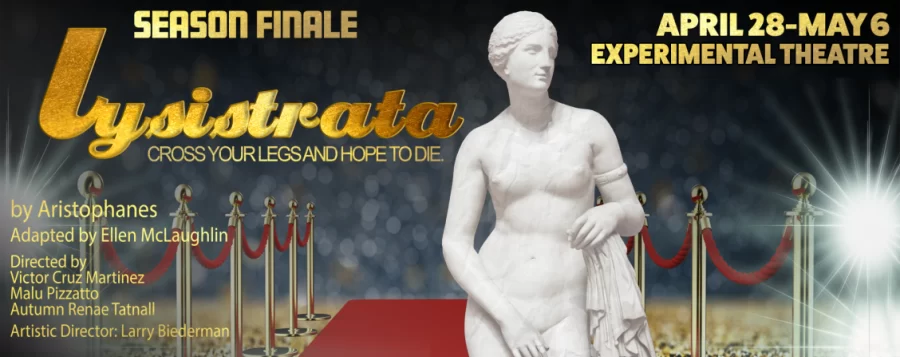CSUN theater department presents: ‘Lysistrata’
April 26, 2023
The CSUN Department of Theatre will host their “Lysistrata” production from April 26 to May 6. The show will be held in the Experimental Theatre on campus.
The production will be directed by three senior theater students: Autumn Tatnall, Victor Cruz Martinez and Malu Pizzatto. They will be led with artistic direction by professor Larry Biederman, who specializes in directing.
“Lysistrata” is a Greek comedy, initially written by Aristophanes, that takes place in Athens in 411 B.C.
The story revolves around an Athenian woman named Lysistrata who devises a plan to end the Peloponnesian War. Her strategy unravels as she brings women together from neighboring cities and unleashes her plan. The women are to withhold any sexual activity from their men to force them to end the war, according to a summary by Ancient Literature.
A magistrate seeks to end the women’s rebellion, but Lysistrata explains the reasoning behind the women’s efforts. She worries that the young women who are childless are left alone to grow old while these men are out at war. Even with Lysistrata’s efforts to convince him, the magistrate does not budge. Instead, he runs off and tells the men about the women’s plans.
The debates continue between the men and women, but women become desperate for sex. Lysistrata intervenes and reminds the women of why they are rebelling, hoping to reignite their passion for the rebellion.
Lysistrata introduces a beautiful, naked young woman to the men, and they cannot seem to be able to look away from her. The men succumb to their temptation and end the war. The two groups come together to dance and sing in unison.
“Lysistrata” was deemed by many as one of Aristophanes’ most successful works, according to Ancient Literature. The production was first staged just two years after Athens’ defeat in the Sicilian Expedition.
According to Tatnall, the department of theater plans to modernize the ancient Greek theater production by setting it in the Y2K era, which blended styles from the early 90s with the 2000s, according to Highsnobiety. This was also an era when women were “unapologetically sexy” and made their own decisions, as stated by Tatnall.


